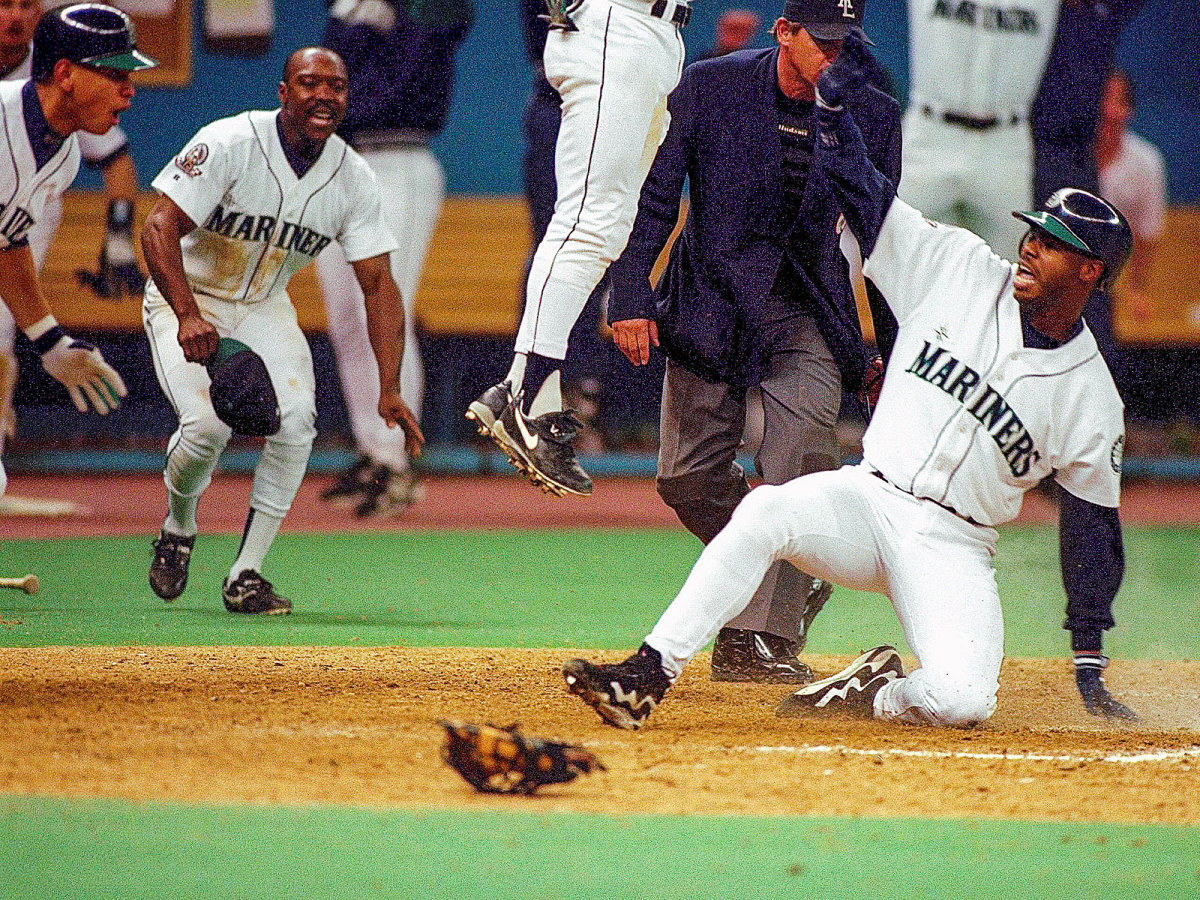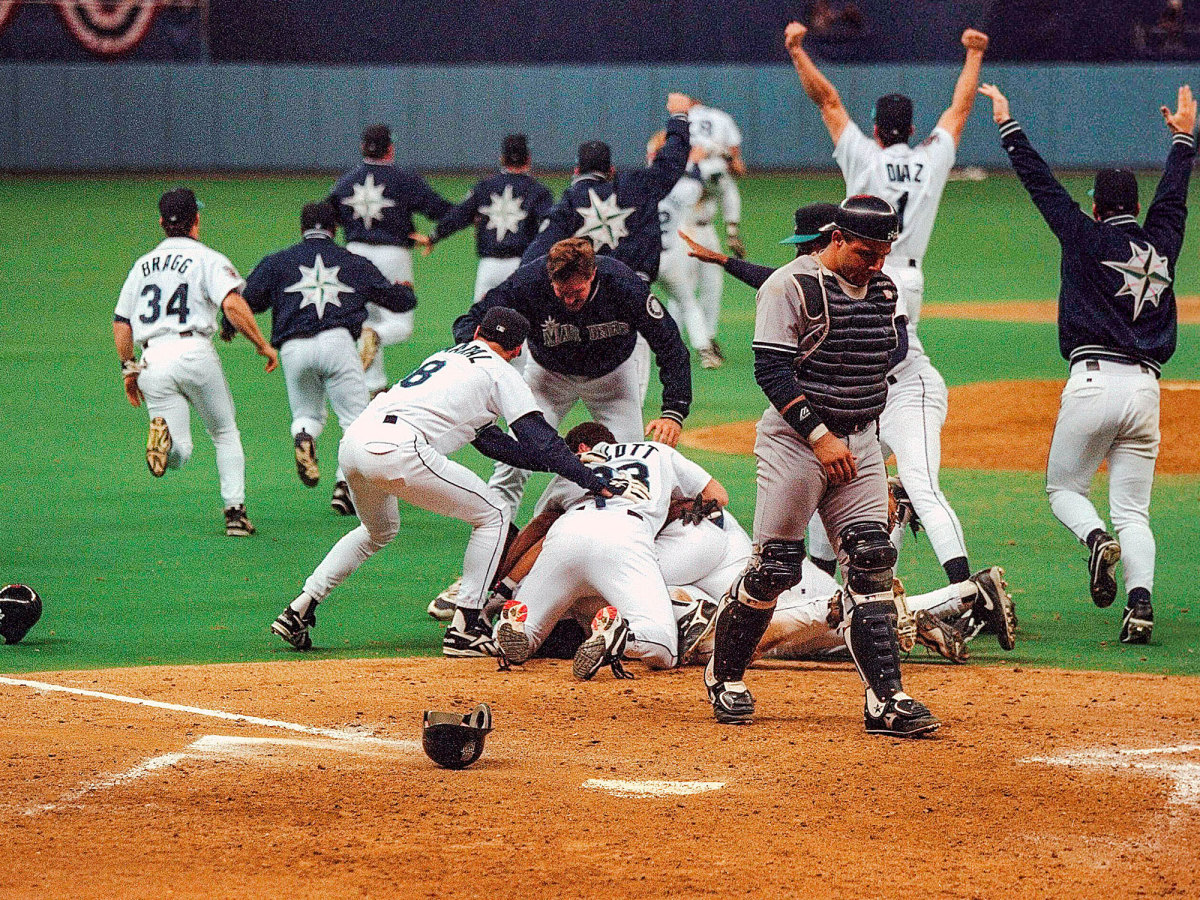Expanded Playoffs Helped MLB Heal in 1995. What About 2020?
Few baseballs in motion held more suspense than the one 25 years ago that skipped across the AstroTurf of Seattle’s Kingdome like a rock over a pond. The skipping lasted long enough to allow the calculus of history to play out in your head.
Could the runner on first dash home faster than the baseball could be returned there? Was Seattle about to lose its Mariners? Were the Yankees about to lose their manager? Would this first nationally televised playoff game in two years bring back fans who had deserted MLB because of a players strike? Would people care about postseason baseball now that—gulp!—second-place teams were invited?
This year the bar for postseason entry was lowered again. Eight of the 15 teams in each league qualified, opening the door for the possibility of a sub-.500 entrant. Due to the pandemic there will be few, if any, fans, and games after a best-of-three first round are being held in bubbles in L.A. and Texas. Structure and settings may change, but as the Mariners and Yankees proved in an epic 1995 American League Division Series, once the ball is put in play, the game has a way of writing its own unforgettable, unscripted narrative.
The left field wall interrupted the baseball’s bouncing, redirecting it into the glove of outfielder Gerald Williams. He whirled and threw it on one bounce to the relay man, shortstop Tony Fernández, who spun and fired a strike into the mitt of catcher Jim Leyritz just as the runner, Ken Griffey Jr., threw himself toward home plate with a feet-first slide.
The cascade of drama unfolded like the car chase scene in The French Connection. In both cases, there has never been anything like it before or since. Griffey beat the ball to the plate. The two-run, 11th-inning double by Edgar Martinez in Game 5 of the ALDS is the only time a series ended on an extra-inning hit that turned a deficit into a victory. The winning run, winning hit and winning decision (Randy Johnson) all belonged to Hall of Famers.
The final score was 6–5. “The best game. The best series ever played,” Seattle reliever Norm Charlton said in the clubhouse. “You saw two teams leave the field exhausted because neither one of us had a damn thing left.”

Like a deus ex machina, Johnson came out of the bullpen on one day of rest to pitch a third elimination game in seven days. His back gave out the next year.
New York starter David Cone threw 147 pitches before he trudged off the mound, visibly exhausted. So withered was Cone he would stay in his New York City apartment for the next week with the shades drawn and a right arm so achy he could not comb his hair. Six months later he suffered a career-threatening aneurysm in that arm.
Cone had served as a prominent union leader during the 1994–95 strike, after which attendance cratered 20%. Said Cone after the game, “If this doesn’t do a lot to diminish the image of the greedy ballplayer, I don’t know what will.”
The series provided the best argument for the newly expanded playoffs, which the strike had wiped out in 1994 and purists had derided. Second-place New York needed a 25–6 finish to grab the first-ever AL wild card, breaking a 13-year playoff drought, the franchise’s longest since it was known as the Yankees. Seattle mounted the third-greatest comeback in history (13 games out on Aug. 2) to seize its first playoff spot. Alas, during that run a stadium-funding referendum failed by about 1,000 votes out of a half-million cast. The Mariners seemed bound for St. Petersburg.

Every game in the series was epic, even if most people didn’t get to see them because coverage was regional. That meant 80% of the country missed the Yankees’ 15-inning win in Game 2 that gave them a 2–0 lead. “I remember leaving Yankee Stadium and wondering how we were going to win a game there,” New York manager Buck Showalter says of the Kingdome. “It was all the bounces and the noise. It was like playing in a pinball machine. All of our communication had to be done in the runway behind the dugout.”
The Yankees were in front in every game and lost the series. They blew eight leads, including a 5–4 advantage against Johnson in the 11th in Game 5. “I was out there in right field in that last inning,” Seattle’s Jay Buhner said after the game, “thinking, My God, this is the best game I’ve ever seen.”
It would only get more exciting. A bunt single by Joey Cora and a single by Griffey set the stage for Martinez against Jack McDowell, whom Showalter picked to make his first career relief appearance over closer John Wetteland. McDowell hung an 0-and-1 splitter. Martinez smacked it on a line, sending the baseball and history into motion.
Don Mattingly never played again, choosing to retire. Yankees owner George Steinbrenner vowed in the clubhouse that night there would be changes, and he was
right. Out went Showalter. In came Joe Torre, who would lead New York to four titles in the next five years.
Another vote in Seattle took place in October. This one passed, keeping the Mariners in town.
Only by the grace of the three other division series having ended did Game 5 get the coverage it deserved. It was the first nationally televised postseason game since Joe Carter homered for the Blue Jays to win the 1993 World Series. It drew an overnight rating of 13.4, better than any of the past 12 World Series games.
“This series,” Showalter says, “was one of the first times people began to put ’94 behind them. Ninety-four broke a lot of hearts. To this day I’ve had more people tell me this series was when they came back, when they said, ‘O.K., this is why we love baseball so much.’ ”

